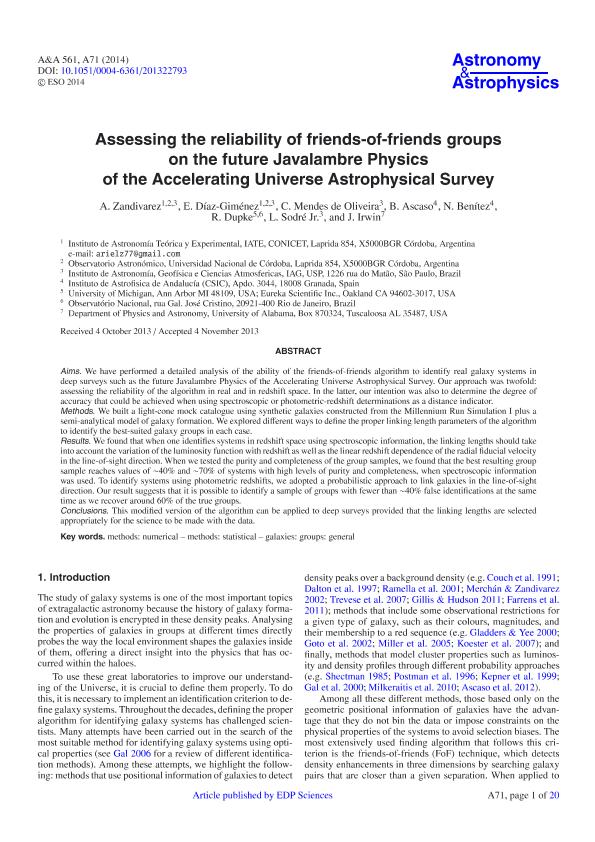Artículo
Assessing the reliability of friends-of-friends groups on the future Javalambre Physics of the Accelerating Universe Astrophysical Survey
Zandivarez, Arnaldo Ariel ; Diaz, Maria Eugenia
; Diaz, Maria Eugenia ; Oliveira, Claudia Mendes de; Ascaso, B.; Benítez, N.; Dupke, R.; Sodré, L.; Irwin, J.
; Oliveira, Claudia Mendes de; Ascaso, B.; Benítez, N.; Dupke, R.; Sodré, L.; Irwin, J.
 ; Diaz, Maria Eugenia
; Diaz, Maria Eugenia ; Oliveira, Claudia Mendes de; Ascaso, B.; Benítez, N.; Dupke, R.; Sodré, L.; Irwin, J.
; Oliveira, Claudia Mendes de; Ascaso, B.; Benítez, N.; Dupke, R.; Sodré, L.; Irwin, J.
Fecha de publicación:
01/2014
Editorial:
EDP Sciences
Revista:
Astronomy and Astrophysics
ISSN:
0004-6361
Idioma:
Inglés
Tipo de recurso:
Artículo publicado
Clasificación temática:
Resumen
Aims: We have performed a detailed analysis of the ability of the friends-of-friends algorithm to identify real galaxy systems in deep surveys such as the future Javalambre Physics of the Accelerating Universe Astrophysical Survey. Our approach was twofold: assessing the reliability of the algorithm in real and in redshift space. In the latter, our intention was also to determine the degree of accuracy that could be achieved when using spectroscopic or photometric-redshift determinations as a distance indicator. Methods: We built a light-cone mock catalogue using synthetic galaxies constructed from the Millennium Run Simulation I plus a semi-analytical model of galaxy formation. We explored different ways to define the proper linking length parameters of the algorithm to identify the best-suited galaxy groups in each case. Results: We found that when one identifies systems in redshift space using spectroscopic information, the linking lengths should take into account the variation of the luminosity function with redshift as well as the linear redshift dependence of the radial fiducial velocity in the line-of-sight direction. When we tested the purity and completeness of the group samples, we found that the best resulting group sample reaches values of ~40% and ~70% of systems with high levels of purity and completeness, when spectroscopic information was used. To identify systems using photometric redshifts, we adopted a probabilistic approach to link galaxies in the line-of-sight direction. Our result suggests that it is possible to identify a sample of groups with fewer than ~40% false identifications at the same time as we recover around 60% of the true groups. Conclusions: This modified version of the algorithm can be applied to deep surveys provided that the linking lengths are selected appropriately for the science to be made with the data.
Palabras clave:
Methods: Numerical
,
Methods: Statistical
,
Galaxies: Groups: General
Archivos asociados
Licencia
Identificadores
Colecciones
Articulos(IATE)
Articulos de INST.DE ASTRONOMIA TEORICA Y EXPERIMENTAL
Articulos de INST.DE ASTRONOMIA TEORICA Y EXPERIMENTAL
Citación
Irwin, J.; Sodré, L.; Dupke, R.; Benítez, N.; Ascaso, B.; Oliveira, Claudia Mendes de; et al.; Assessing the reliability of friends-of-friends groups on the future Javalambre Physics of the Accelerating Universe Astrophysical Survey; EDP Sciences; Astronomy and Astrophysics; 561; 1-2014; 71-91; A71
Compartir
Altmétricas



